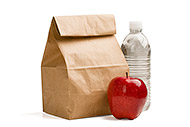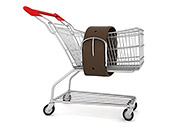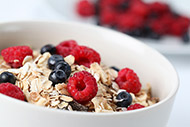
We all know that unhealthy eating can lead to weight gain and chronic disease, but we often overlook the bothersome symptoms of a poor diet that can make daily life uncomfortable and lead to more serious issues in the future. Here are five of those symptoms.
Heartburn
Heartburn is that uncomfortable feeling in the back of the throat that is caused when stomach acid irritates the esophagus. It can be triggered by overeating and by eating high-fat foods, spicy foods, or chocolate. Drinks such as coffee, alcohol, and carbonated beverages are also culprits. Many underestimate the influence of unhealthy eating habits on heartburn. Simple changes such as eating more slowly, avoiding overeating, and limiting your intake of greasy, fried foods can be helpful in reducing symptoms. Keep in mind that if heartburn persists, it could be gastroesophageal reflux disease (GERD), which may require medical treatment.
Bloating and Upset Stomach
Fatty foods often have one of two effects on the digestive tract — they slow emptying (which worsens constipation) or they speed up emptying (which can contribute to diarrhea). Either condition can leave you with an upset stomach, bloating, and abdominal pain. Reducing fatty, greasy foods can decrease these symptoms. Additionally, dietary fiber promotes a healthy digestive system. The majority of dietary fiber comes from fruits, vegetables, and whole grains. A rapid increase in fiber can lead to more bloating and gas, so be sure to increase it gradually until you reach 25 to 35 grams per day.
Water Retention
Fast food, pre-made frozen meals, packaged snacks, and many canned foods are loaded with sodium. When you consume excess sodium, water is retained until the body can regain fluid balance by excreting the excess through the urinary system. This causes you to feel bloated and uncomfortable. It can also show itself as extra pounds on the scale. Reducing sodium in your diet not only reduces water retention, but it promotes a healthy blood pressure, which can reduce your risk for heart disease.
Lack of Energy
Foods that are high in simple carbohydrates cause blood sugar to spike, which is followed by a blood sugar drop soon after. Often called a sugar crash, this is the reason a high carbohydrate, sugary breakfast can leave you in an energy slump a few hours later. To help stabilize blood sugar and prevent this crash, choose foods that contain fiber and healthy fats, and include protein in each meal and snack.
According to the National Sleep Foundation, carbohydrates also increase the amount of tryptophan available to the brain, which may cause drowsiness.
Poor Sleep
Heartburn caused by greasy foods and overeating is only one of many things that keep you from a restful night of sleep. While a direct link between vitamins and insomnia is not completely clear, research suggests that some vitamin and mineral deficiencies affect sleep. For example, vitamin B6 aids in the production of the sleep-inducing hormone melatonin, and magnesium plays a role in regulating sleep. These nutrients are plentiful in healthy foods such as fish, fruits, vegetables, seeds, and whole grains. A diet lacking in these foods is at risk for deficiencies that may make it harder to sleep. Alcohol intake also disrupts sleep and may prevent you from falling into the deeper stages of sleep necessary for a restful night.
Sources



 3 Healthy Lunches for Your Work Week
3 Healthy Lunches for Your Work Week
 5 Tips for Stretching Your Budget for Healthy Food
5 Tips for Stretching Your Budget for Healthy Food
 Best Ways to Reduce Added Sugar
Best Ways to Reduce Added Sugar
 Healthy Tips to Lighten Up Picnic Foods
Healthy Tips to Lighten Up Picnic Foods
 Do You Need to Drink Milk?
Do You Need to Drink Milk?
 Tips to Keep Track of Water Intake
Tips to Keep Track of Water Intake
 What Is a Paleo Diet?
What Is a Paleo Diet?
 Eating to Build Muscle
Eating to Build Muscle

 Pinterest
Pinterest RSS Feed
RSS Feed